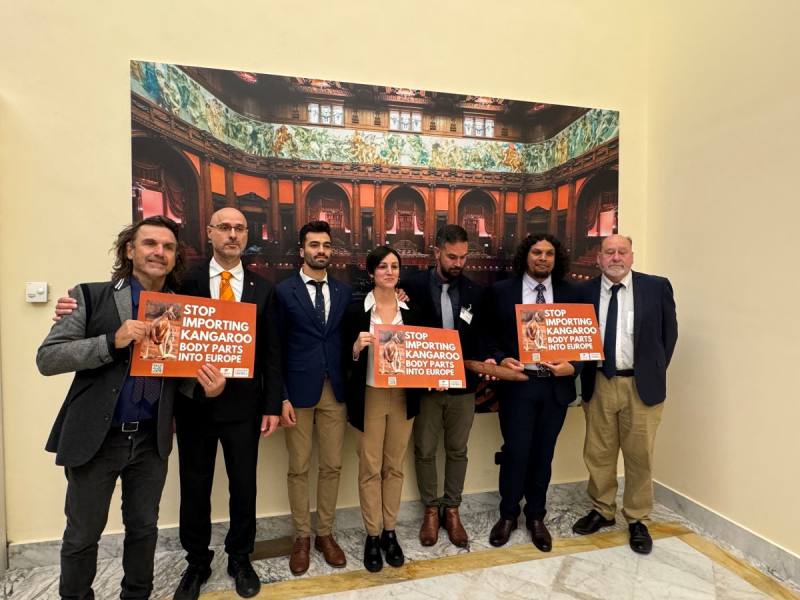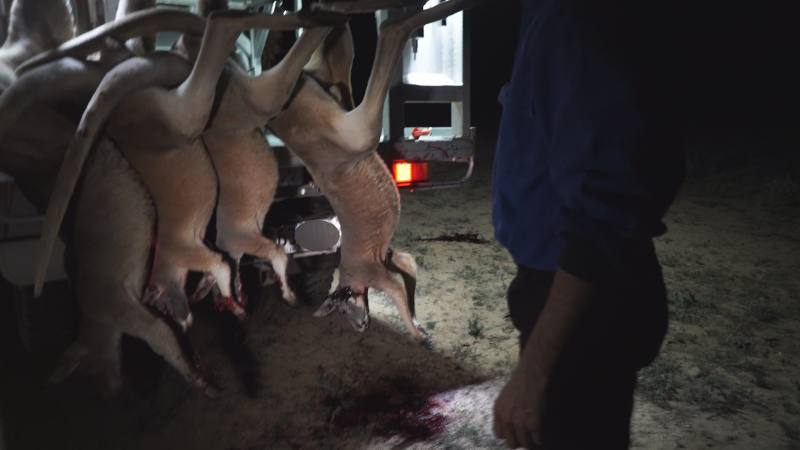Rome: kangaroos enter the Chamber of Deputies
Watch the recorded Press Conference.
Italy is the first EU country to import kangaroo skins with 381 tonnes between 2019-2022, for a total value of 3.8 million euro, and the fifth in the world, together with Vietnam, after Turkey, Pakistan, India, Indonesia.
To bring the issue of kangaroos into the Italian political debate, the European tour of an Australian delegation led by representatives of the Yuin Aboriginal community is starting from Rome.
The delegation will also visit The Hague and Brussels Parliaments to support similar proposals for a national ban on the import and trade of kangaroo skins and meat, finally stopping in Strasbourg on World Kangaroo Day, 24 October, where they will meet MEPs from the European Parliament's Intergroup on Animal Welfare.

This morning, Wednesday 16 October, a press conference called by LAV was held at the Press Room of the Chamber of Deputies to denounce Italy's active role in the slaughter of more than 1.5 million kangaroos every year and to urge the start of work on bill C.961 which, when approved, will introduce in Italy (and for the first time in the European Union) a national ban on the import and trade of products resulting from the commercial hunting of kangaroos.
According to a recently published poll, 78% of Italians are in favour of banning the import and trade of kangaroo skins and meat in Italy.
Peter Hewitt Jerrinja-Yuin and Ricky Buchanan Gumbaynggirr, commissioned by the elders of the Back To Country cultural organisation to represent the Yuin Aboriginal community and testify to the need for action at both national and European level, spoke very clearly:
In our culture, we only take what we need and do it in ceremony. We do not want to see kangaroos killed en masse by the industry for their meat and skin; we are carrying the ‘Buru’ Message Stick, to invite European politicians to listen with their hearts, to hear the history of the country and to understand how the disrespect and desecration of such an important animal is damaging the land and its people.
Mick McIntyre, documentary filmmaker. and film producer, who witnessed the kangaroo slaughter also argued that:
There is great pride in Australia's role in being one of the strongest voices opposing whaling; yet, kangaroos do not enjoy any special attention from the Australian government which, instead, heavily promotes their killing for the export of meat and skins.
With the Save Kangaroos campaign initiated by LAV in 2019 and part of a global campaign, we achieved important results with some companies that, sensitised, immediately divested from production such as: Diadora (for football boots), Prada, Versace, Ferragamo, and before that even Gucci for luxury footwear and accessories. In the past, Italy has been a leading country in Europe in banning the import of seal fur; today, with bill C.961 ( first signatory Hon. E. Evi), Italy has the opportunity to take action to combat the killing of over 1.5 million kangaroos a year and be the first Member State to do so.
They call it ‘harvesting’, i.e. taking, and they propose it as something ‘sustainable’; in reality, the commercial hunting of kangaroos is a real massacre, involving animals that are not sick or weak, but healthy and
strong individuals. It happens at night, the animals are hunted by hunters in pick-up trucks and brutally shot: more than 1.5 million adult kangaroos are killed every year for commercial purposes; most are females with cubs, themselves ‘collateral’ victims.
 A slaughter that also has social repercussions on the Aboriginal peoples, the First Nations People, who see kangaroos as a sacred totem and who are now in Rome to ask Italy to stop being complicit in this barbarity.
A slaughter that also has social repercussions on the Aboriginal peoples, the First Nations People, who see kangaroos as a sacred totem and who are now in Rome to ask Italy to stop being complicit in this barbarity.
Supporting the stop to kangaroo hunting (and therefore commercial exploitation) are some 80 organisations including global animal rights, species conservation, veterinary and rescue groups, including LAV for Italy, GAIA (Belgian NGO), World Animal Protection, IFAW, WIRES, Animals Australia, Voiceless, Animals Asia, Eurogroup for Animals, Vets for Compassion, the Animal Welfare Institute and Professor Peter Singer (Australian philosopher and pioneer of the animal rights movement). Together they signed a Declaration calling for an end to the commercial killing of kangaroos because of its cruel practices.
The slaughter of kangaroos that takes place every year in Australia in order to sell meat and skins of this beautiful animal weighs heavily on the conscience of our country, as we are the first importer of these products stained with blood, often innocent, considering the many kangaroo cubs that are exterminated in night hunts with shotguns. Those who speak of a traceable and sustainable supply chain are lying when they know they are lying, as evidenced by the activities of the New South Wales Parliamentary Commission of Inquiry, which sheds light on this cruel practice. Change is possible, as evidenced by the many Italian companies already committed to divesting themselves of imports of these products. A national ban is what is needed to complete this journey, started thanks to the work of tireless associations such as LAV, which has been fighting to achieve this since 2019. Today, the testimony of Australian representatives of the Yuin Aboriginal community must make us reflect deeply on the way we treat animals, still seen as merchandise and objects instead of sentient beings that deserve respect.
Thanks to the legislative proposal C.961 deposited by On. Eleonora Evi, Italy has the chance to be a leading country in Europe in adopting a measure that is also consistent with the recent Constitutional amendments, according to which private economic initiative cannot be carried out in conflict with social utility or in such a way as to damage the environment (art. 41 of the Constitution). Cost); and the killing of millions of wild animals for mere commercial purposes is clearly a practice in conflict with the constitutional principle of protection of the environment, biodiversity, and ecosystems, also in the interest of future generations (Article 9 Cost).
